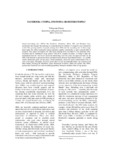| dc.contributor.author | Zaman, Tabassum | |
| dc.date.accessioned | 2016-04-20T11:30:08Z | |
| dc.date.available | 2016-04-20T11:30:08Z | |
| dc.date.copyright | 2010 | |
| dc.date.issued | 2010 | |
| dc.identifier.citation | Zaman, T. (2010). Facebook : utopia, dystopia or heterotopia. BRAC University Journal, Special Issue(01), 170–179. | en_US |
| dc.identifier.issn | 1811-3079 | |
| dc.identifier.uri | http://hdl.handle.net/10361/5174 | |
| dc.description | Includes bibliographical references (page 178-179). | en_US |
| dc.description.abstract | Social networking sites (SNSs) like Facebook, Friendster, Orkut, Hi5, and MySpace have accelerated and changed the meaning of communication for millions of computer users around the world. The growing number of people joining these SNSs and the ascending rate of their usage hours make this rather somatically taxing experience qualify semiotically as quite a potent field of research. This paper investigates the time-space defying locus provided by one particular SNS, Facebook and its multilateral usage pattern with all its complex dynamics, to bring to light the mechanisms that are vital for its successful functioning. Over the years, the space provided by the SNS or the Internet in general has been considered under different hypothetical frames – as a public sphere, democratic space, private space, virtual community, discursive space, transformative site, or even a non-space. The paper, however, posits that it is not one particular frame, but a fusion of all these frames, forming one alternative space, heterotopic in nature, which can explain why SNSs, particularly Facebook have such escalating popularity among its members from all age groups. | en_US |
| dc.description.statementofresponsibility | Tabassum Zaman | |
| dc.format.extent | 11 pages | |
| dc.language.iso | en | en_US |
| dc.publisher | BRAC University | en_US |
| dc.rights | BRAC University Journals are protected by copyright. They may be viewed from this source for any purpose, but reproduction or distribution in any format is prohibited without written permission. | |
| dc.subject | Facebook | en_US |
| dc.title | Facebook : utopia, dystopia or heterotopia | en_US |
| dc.type | Article | en_US |
| dc.contributor.department | Department of English and Humanities, BRAC University | |

